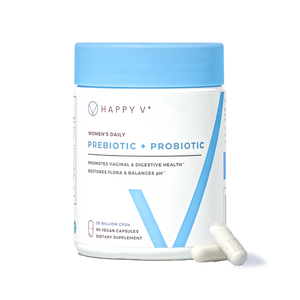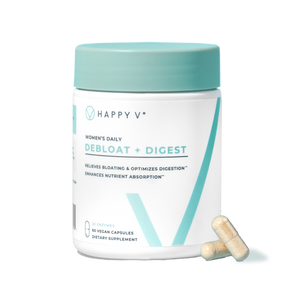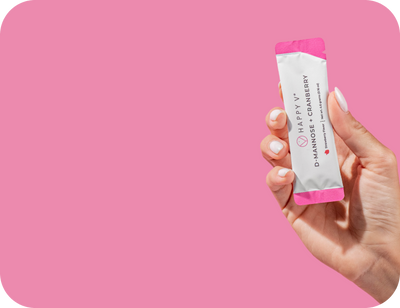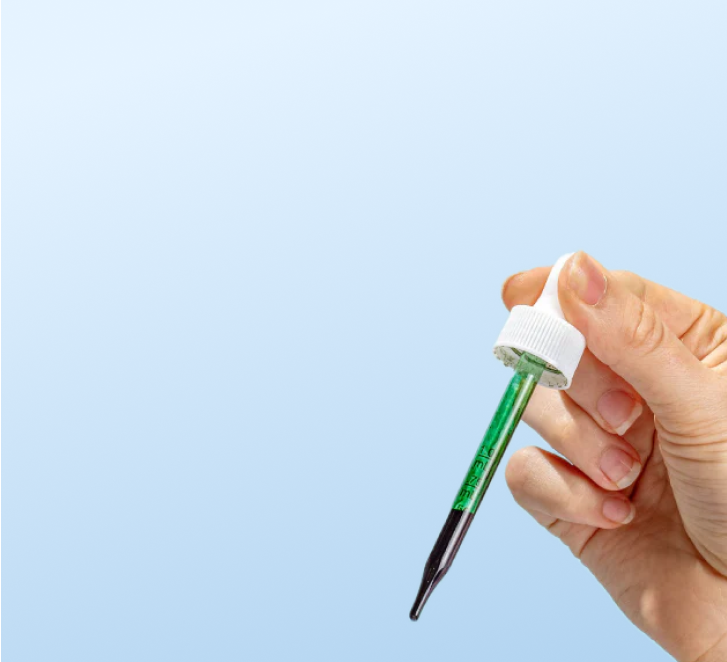- Fact Checked
- June 12, 2025
- 10 min read
How to Know If Your Probiotics Are Working (or Aren’t)
Table of Contents
Table of Contents
Probiotics are everywhere—on shelves, in smoothies, even in skincare. But how do you know if they’re actually doing anything?
Whether you're taking probiotic products for gut health, vaginal balance, immunity, or mood, this guide explains how probiotics work, what results to look for, and how to know whether your supplement is worth it.
If you’re dealing with digestive issues, skin flare-ups, weakened immunity, or frequent infections, your body might signal that your gut needs help.
Even if you're symptom-free, daily probiotic use can support prevention and long-term wellness goals and promote a balanced gut.
This post is for informational purposes only and does not constitute medical advice. See full disclaimer below.
What Are Probiotics and Why Do They Matter?

According to the WHO, probiotics are “live microorganisms which when administered in adequate amounts confer a health benefit on the host”. These health benefits can include maintaining your vaginal pH, improving gut health, and strengthening your immunity.
You can find them in certain probiotic-enhanced yogurts and kefir, but they are most common in supplement form.
8 Signs You Might Need Probiotics

Daily probiotic supplements can be a smart addition to the daily routine of anyone looking to improve their overall wellness, but given how they actually function within the body, they can be especially good if you're someone who:
-
Has ongoing digestive issues
If you're struggling with bloating, constipation, gas, and general discomfort after eating, this can point to an imbalanced gut microbiome that is affecting digestive function. Probiotics can help with that. -
Has recently taken antibiotics or had food poisoning
Both of these can totally deplete the levels of good bacteria in your body, which can lead to lingering digestive issues or secondary infections. Probiotics can boost these levels and rebalance your microbiome.
-
Gets sick frequently
70% of your immune system resides in your GI tract. If you're getting sick frequently - even with non-GI-related illnesses - improving your gut health with probiotics can increase your overall immunity.
-
Experiences acne, eczema, or skin irritation
Along with immunity, gut health also affects skin health. Imbalances in your gut microbiome can present as inflammation, breakouts, or chronic skin conditions.
-
Feels foggy, anxious, or struggles with sleep
Think the gut can't possibly affect anything else? Think again. It plays a huge role in regulating mood, cognition, and sleep cycles.
-
Has had unexplained weight changes
If you've gained or lost weight without a clear dietary or lifestyle cause, gut issues and inflammation could be to blame, both of which can improve with targeted probiotics.
-
Gets frequent UTIs or yeast infections
Probiotics don't just benefit the gut, but the vaginal microbiome as well, protecting against infections. If you can't kick your UTIs or yeast infection, increasing your probiotic intake could help. -
Feels run-down or low on energy
If you continue to feel tired and sluggish even after a night of rest, it could be because poor nutrient absorption in the gut. Quality probiotics can improve absorption, and your energy levels along with them.
What About Prebiotics & Synbiotics?
We've covered what probiotics are and how they can help. Now let's talk about two other words you hear a lot in this space: prebiotics and synbiotics.
According to the ISAPP (that’s the International Scientific Association for Probiotics and Prebiotics), prebiotics are "a substrate that is selectively utilized by host microorganisms conferring a health benefit". To make it really simple, they are a material that is used by other organisms (like prebiotics). Prebiotics occur naturally in fiber-based foods like bananas, oats, and vegetables.
When prebiotics are combined with probiotics, the result is a synbiotic. It’s important to note, though, that you cannot just combine prebiotics with probiotics and expect a beneficial effect. Some probiotic strains benefit from pairing with specific prebiotics; others don’t. This is where quality and transparency come into play. Look for synbiotics that are based in science, not assumptions.
How Probiotics Work

Probiotics work in a few different ways. First, just by existing in your gut or vagina, they are competing for space and resources with infection-causing bacteria. They are literally crowding the bad guys out.
They also:
- Produce lactic acid and hydrogen peroxide, which keep a slightly acidic pH that kills bad bacteria
- Promote butyrate production in the gut, which reinforces the intestinal lining
- Stimulate the immune response
- Support serotonin production, which helps with mood balance and clarity
It's important to know, though, that not all probiotics have these effects. Only certain strains do, so it's important to make sure your probiotic only uses strains that have been clinically studied. Also make sure that your probiotic supplement uses acid-resistant capsules or delayed-release technology. This helps probiotics survive long enough to actually populate in your body, and not just get killed in your stomach.
When Will You (Generally!) Start Seeing Results?

The answer to this depends on your health history, your current symptoms, and how consistently you take your probiotics. While some changes happen within weeks, others take more time. Most people starting probiotics find it helpful to keep a journal to track their daily symptoms, so they can notice changes.
“Probiotics are not drugs,” says Dr. Jessica Younes, the Scientific Director, International Probiotics Association. “They aren’t designed to work overnight. They have a slower, more consistent way of supporting your body, instead of directly targeting one or two symptoms like a drug would.”
Though probiotics are not like traditional prescription medicines, and every body is different, here is what most people report when it comes to their results timeline:
| Health Area | Expected Changes | Timeline |
|
Digestive issues (IBS, bloating, constipation) |
Improved motility, less discomfort |
2–4 weeks |
|
Immune system |
Fewer colds, quicker recovery |
4–8 weeks |
|
Skin health |
Fewer flare-ups, reduced inflammation |
6–12 weeks |
|
Vaginal health |
Improved discharge, reduced infections |
4–8 weeks |
|
Weight/metabolism |
Waistline improvement, energy balance |
8–12 weeks |
|
Mental health & sleep |
Better sleep, mood, and clarity |
8–12 weeks |
Are There Side Effects of Taking Probiotics?

Not usually, no. And any side effects people do experience are often related to tolerance and their body adjusting to the introduction of these new microbes into their system.
Most people tolerate probiotics well, but as your gut microbiome adjusts, temporary side effects can occur, especially in the first week or two. These are generally mild and temporary. That said, understanding what to expect helps you know when to adjust or speak with a healthcare provider.
However, temporary side effects may include mild bloating or gas. These tend to only last for a few weeks. If you are experiencing more prolonged or severe symptoms than this, stop taking your probiotics and call your doctor.
If you have a chronic condition or a weakened immune system, consult a healthcare provider first.
Signs Your Probiotic Is Working

The signs your probiotic is working depend on what symptoms caused you to start taking them in the first place. For many people, though, the first signs of improvement include:
- Less odor, discharge, or UTI symptoms (for urogenital infections)
- Less gas, bloating, and more regularity (for digestive issues)
- Fewer breakouts or reduced eczema (for skin issues)
- Better sleep and mood (for general wellness)
Remember, these changes don't happen overnight, and consistency is key. Most people notice these changes within 4-8 weeks of daily use. If it's been 12 weeks or longer and you haven't noticed any improvements, you may not be using the right probiotic strain(s), as each strain works differently and is designed to do different things.
Why a Probiotic Might Not Be Working
If you are struggling to see results with your probiotic, even after consistent use, there could be a few factors at play, like:
- Strain mismatch. Generic probiotics may not include the targeted strains you need to clear up specific issues.
- Improper dosage. Even if your probiotic offers the right strains, they may not be dosed at effective levels, which means you don't see the benefits, or you will only see them over a very (very!) long time.
- Poor diet. Probiotics aren’t designed to compete with or overcome the detrimental effects of a diet high in processed foods and low in fiber. In fact, that may sabotage your progress.
- Storage issues. Exposure to heat and moisture can render probiotics ineffective, even if they are within their expiration dates. Probiotics must be protected from moisture so that they can remain sleeping until it is time for them to wake up and perform when you take them (kinda cool, right?).
How to Choose the Right Probiotic

With so many probiotics lining the shelves, it’s easy to feel overwhelmed. And you do have to be smart about what you buy because not all probiotics are created equal.
Luckily, choosing a quality probiotic comes down to just a few key things:
- Clinically Relevant Dosage: The strains should be dosed at levels proven effective in actual clinical studies, not just whatever they felt like putting in.
- Transparent CFU Counts: When checking dosages, make sure they are listed in CFUs. "Proprietary blends" are a red flag. “Mg” is better than “proprietary blend”, but still not the ideal measurement for probiotic dosages.
- Strain-Specific Labeling: Dr. Younes says, “A high-quality probiotic will list the genus, species, and strain on the label (think: L. rhamnosus HN001™, not just a vague “Lactobacillus” or “Lactobacillus rhamnosus”).”
- Guaranteed Expiration Date: Make sure the product guarantees viability up to its expiration date, assuming you store it as directed.
- Clear Storage Instructions: Another great Dr. Younes tidbit: “Because probiotics are actually alive, they typically come with storage instructions that help keep them that way. Look to see whether your supplement should be kept in the fridge or is shelf-stable.”
Match Strains to Goals
Make sure always to read the label to choose the right probiotic for the right reason. Below is an example of a cheat sheet for matching specific strains for specific uses.
| Health Issue | Proven Strains |
| IBS / constipation | B. subtilis DE111®, B. lactis HN019™, PreforPro® (Bacteriophage blend) |
| Vaginal health | L. acidophilus LA-14®, L. rhamnosus HN001™, L. crispatus CCFM1110™, L. gasseri HLG13™, L. reuteri HR7™, PreforPro® |
| Immunity | B. lactis HN019™, L. acidophilus LA-14®, PreforPro® |
| Skin health | B. bifidum, B. lactis, L. acidophilus |
| Weight/metabolism | L. acidophilus LA-14®, B. lactis HN019™ |
Tracking Progress
Keeping track of how your body responds to probiotics is one of the best ways to evaluate effectiveness. A simple journal or notes app can help you spot improvements or plateaus in your digestive issues, skin health, immunity, and overall wellness. Use the table below to track changes and reassess after 6–8 weeks:
| Metric | What to Track | Frequency |
| Digestive issues | Bloating, stool form, cramping, stool frequency | Daily |
| Immune system | Cold frequency, duration, symptoms | Monthly |
| Mental health | Mood (1–10), clarity, mental resilience | Weekly |
| Sleep quality | Time to sleep, nighttime waking, energy upon waking | Daily |
| Weight/metabolism | Waist circumference, cravings | Weekly |
| Skin health | Eczema, acne, dryness | Weekly |
| Vaginal health | Discharge quality and amount, odor, recurrence | Weekly |
Final Thoughts
Probiotic supplements offer benefits beyond digestion. If you’re noticing recurring issues or just want to feel better day-to-day, your gut might be the place to start. After all, as Hippocrates said so many centuries ago, all diseases start in the gut.
Choosing a high-quality probiotic with proven strains—backed by clinical trials or scientific review—can support better gut health, immune resilience, mental clarity, cognitive function, and even skin.
For a trusted, clinically formulated product, try Happy V’s Prebiotic + Probiotic. It’s designed to support your vaginal, digestive, and immune systems—without the guesswork.
Your gut talks. Probiotics help you listen.
FAQ
What are vaginal probiotics for?
Are vaginal probiotics good for vaginal health?
How long does it take for Happy V Prebiotic + Probiotic to work?
What unique ingredient does Happy V Prebiotic + Probiotic contain and what are its benefits?
Our experts continually monitor the health and wellness space, and we update our articles when new information becomes available.
- Published on: June 12, 2025
- Last updates: December 03, 2025
Written by Hans Graubard
Edited by Liz Breen














